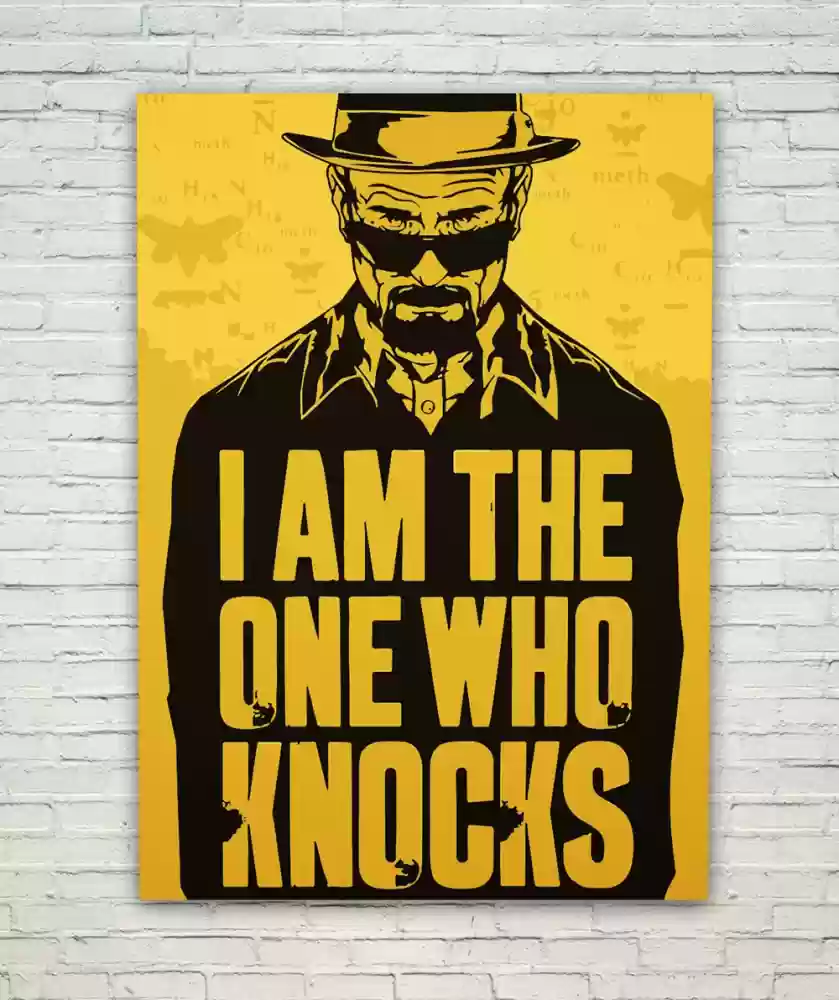Overview of Breaking Bad
Breaking Bad, created by Vince Gilligan, aired from 2008 to 2013 and follows the story of Walter White, a high school chemistry teacher diagnosed with terminal lung cancer. Faced with financial difficulties and the desire to secure his family’s future, Walter turns to cooking methamphetamine, entering the dangerous world of drug trafficking. As the series progresses, Walter adopts the alias “Heisenberg” and becomes increasingly involved in the criminal underworld.
The Scene
The line “I am the one who knocks” is delivered in Season 4, Episode 6, titled “Cornered.” In this pivotal scene, Walter confronts his wife, Skyler, who expresses her fears about the dangers associated with Walter’s criminal activities. Walter’s response reveals his complete transformation into Heisenberg, showcasing his pride in his criminal identity and his willingness to embrace violence.
Breakdown of the Scene
- Setting: The confrontation takes place in the White household, a space that has been a sanctuary for Walter and his family. The domestic setting contrasts sharply with the violent world Walter has entered.
- Character Dynamics: This scene marks a turning point in Walter’s relationship with Skyler. She sees him not just as her husband but as a dangerous criminal. Walter’s assertion of power highlights his descent into moral ambiguity.
- Emotional Weight: The tension in this scene is palpable. Skyler’s fear and Walter’s arrogance create a dramatic conflict that illustrates the stakes of Walter’s choices.
- Cinematography and Direction: The use of close-ups on the characters’ faces amplifies the emotional intensity. Walter’s demeanor shifts from defensive to aggressive, reflecting his internal transformation.
The Significance of the Line
Themes of Power and Control
Walter’s declaration, “I am the one who knocks,” signifies his complete embrace of power and control. Throughout the series, Walter struggles with feelings of inadequacy and failure. This line marks a moment of empowerment, as he asserts his dominance over his circumstances and the people around him.
Identity and Transformation
Walter’s transformation from Walter White to Heisenberg is central to the narrative of Breaking Bad. The line encapsulates this duality, illustrating how Walter has shed his previous identity in favor of one that embodies danger and authority. It raises questions about the nature of identity and the lengths to which individuals will go to assert themselves.
Moral Ambiguity
The line also highlights the moral ambiguity that permeates the series. Walter’s pride in his criminal activities challenges viewers to reconsider their perceptions of right and wrong. It prompts discussions about the consequences of one’s choices and the moral compromises individuals make in pursuit of their goals.
Cultural Impact
Reception and Analysis
The “I am the one who knocks” scene has been widely analyzed and discussed in various media. Critics and fans alike have praised it for its powerful writing and acting. Bryan Cranston’s portrayal of Walter White earned him multiple awards, including several Primetime Emmy Awards for Outstanding Lead Actor in a Drama Series.
Influence on Popular Culture
The line has become a cultural touchstone, referenced in various contexts beyond the show. It has been quoted in memes, parodies, and discussions about power dynamics in both fictional and real-world scenarios. The phrase embodies the archetype of the antihero, resonating with audiences who are drawn to complex characters.
Academic Perspectives
Scholars have examined the scene through various lenses, including gender studies, psychology, and cultural studies. For instance, some analyses focus on the gender dynamics at play, exploring how Walter’s assertion of power reflects societal expectations of masculinity. Others investigate the psychological implications of his transformation, considering the impact of trauma and identity.
Table: Key Elements of the “I Am the One Who Knocks” Scene
| Element | Description |
|---|---|
| Character | Walter White (Heisenberg) |
| Episode | Season 4, Episode 6: “Cornered” |
| Themes | Power, control, identity, moral ambiguity |
| Setting | The White household, contrasting domesticity with criminality |
| Emotional Tone | Tense, confrontational, revealing deep-seated fears and desires |
| Cinematography | Close-ups and dramatic lighting to enhance emotional intensity |
| Cultural Impact | Iconic line referenced in various media, analyzed in academic and popular contexts |
FAQ Section
What does “I am the one who knocks” mean?
The phrase signifies Walter White’s assertion of power and his transformation into a dangerous figure within the drug trade. It reflects his embrace of his identity as Heisenberg and his willingness to engage in violence.
Why is this scene considered iconic?
The scene is iconic due to its powerful writing, intense performances, and the pivotal moment it represents in Walter White’s character arc. It encapsulates the themes of power and moral ambiguity that define Breaking Bad.
How does this line relate to Walter White’s character development?
The line marks a significant turning point in Walter’s character development, showcasing his transformation from a passive individual to an assertive and dangerous figure. It highlights his internal struggles and the consequences of his choices.
What are some critical interpretations of the scene?
Critics have analyzed the scene from various perspectives, including gender dynamics, moral ambiguity, and psychological implications. Some interpretations focus on the societal expectations of masculinity and the impact of power on identity.
How has this line influenced popular culture?
The line has become a cultural reference point, appearing in memes, parodies, and discussions about power dynamics. It resonates with audiences and reflects the complexities of antihero narratives.
Where can I find more information about Breaking Bad?
For more detailed information, you can visit the Wikipedia page on Breaking Bad.
What is the significance of Walter’s relationship with Skyler in this scene?
Walter’s relationship with Skyler shifts dramatically in this scene. Her fear of him signifies the loss of trust and the moral decay of their relationship, emphasizing the personal costs of Walter’s choices.
How does the scene reflect broader societal issues?
The scene can be seen as a commentary on power, masculinity, and the consequences of ambition. It raises questions about the lengths individuals will go to achieve success and the moral compromises they make along the way.
What role does Bryan Cranston’s performance play in this scene?
Cranston’s performance is crucial in conveying the emotional weight of the scene. His ability to shift between vulnerability and aggression enhances the impact of Walter’s transformation and the tension between him and Skyler.
Are there any notable references to this scene in other media?
Yes, the phrase and its themes have been referenced in various forms of media, including television shows, films, and social media. It has become synonymous with the archetype of the antihero and the complexities of moral choice.
Conclusion
The line “I am the one who knocks” is a powerful moment in Breaking Bad that encapsulates Walter White’s transformation into Heisenberg. It highlights themes of power, identity, and moral ambiguity, making it one of the most memorable quotes in television history. The scene’s impact extends beyond the series, influencing popular culture and prompting discussions about the nature of ambition and the consequences of one’s choices. As viewers reflect on Walter’s journey, they are invited to consider the complexities of human behavior and the moral dilemmas that arise in the pursuit of power.



